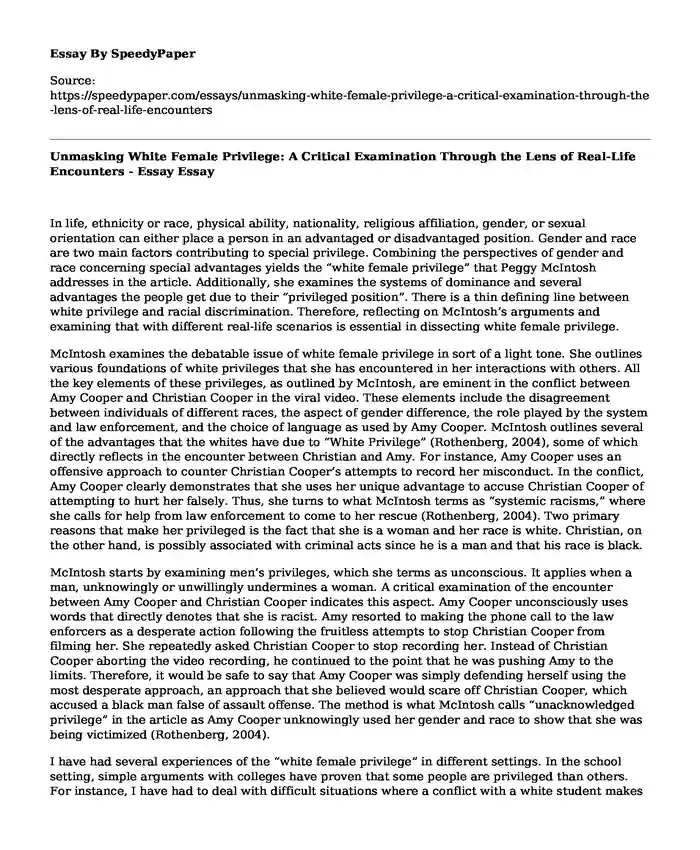In life, ethnicity or race, physical ability, nationality, religious affiliation, gender, or sexual orientation can either place a person in an advantaged or disadvantaged position. Gender and race are two main factors contributing to special privilege. Combining the perspectives of gender and race concerning special advantages yields the “white female privilege” that Peggy McIntosh addresses in the article. Additionally, she examines the systems of dominance and several advantages the people get due to their “privileged position”. There is a thin defining line between white privilege and racial discrimination. Therefore, reflecting on McIntosh’s arguments and examining that with different real-life scenarios is essential in dissecting white female privilege.
McIntosh examines the debatable issue of white female privilege in sort of a light tone. She outlines various foundations of white privileges that she has encountered in her interactions with others. All the key elements of these privileges, as outlined by McIntosh, are eminent in the conflict between Amy Cooper and Christian Cooper in the viral video. These elements include the disagreement between individuals of different races, the aspect of gender difference, the role played by the system and law enforcement, and the choice of language as used by Amy Cooper. McIntosh outlines several of the advantages that the whites have due to “White Privilege” (Rothenberg, 2004), some of which directly reflects in the encounter between Christian and Amy. For instance, Amy Cooper uses an offensive approach to counter Christian Cooper’s attempts to record her misconduct. In the conflict, Amy Cooper clearly demonstrates that she uses her unique advantage to accuse Christian Cooper of attempting to hurt her falsely. Thus, she turns to what McIntosh terms as “systemic racisms,” where she calls for help from law enforcement to come to her rescue (Rothenberg, 2004). Two primary reasons that make her privileged is the fact that she is a woman and her race is white. Christian, on the other hand, is possibly associated with criminal acts since he is a man and that his race is black.
McIntosh starts by examining men’s privileges, which she terms as unconscious. It applies when a man, unknowingly or unwillingly undermines a woman. A critical examination of the encounter between Amy Cooper and Christian Cooper indicates this aspect. Amy Cooper unconsciously uses words that directly denotes that she is racist. Amy resorted to making the phone call to the law enforcers as a desperate action following the fruitless attempts to stop Christian Cooper from filming her. She repeatedly asked Christian Cooper to stop recording her. Instead of Christian Cooper aborting the video recording, he continued to the point that he was pushing Amy to the limits. Therefore, it would be safe to say that Amy Cooper was simply defending herself using the most desperate approach, an approach that she believed would scare off Christian Cooper, which accused a black man false of assault offense. The method is what McIntosh calls “unacknowledged privilege” in the article as Amy Cooper unknowingly used her gender and race to show that she was being victimized (Rothenberg, 2004).
I have had several experiences of the “white female privilege” in different settings. In the school setting, simple arguments with colleges have proven that some people are privileged than others. For instance, I have had to deal with difficult situations where a conflict with a white student makes them feel more comfortable and confident that they are right and will have their way. The blacks who are the minority and marginalized turns out to be uncomfortable and alienated. As McIntosh states, the race places whites in a position protected from violence and hostility in any form of argument. However, Amy Cooper’s and Christian Cooper’s case shows that the outcomes of the encounter did not favor Amy. Everyone in society was against the act, making her the actual victim of the white female privilege.
References
Rothenberg, P. S. (2004). Race, class, and gender in the United States: An integrated study. St. Martin’s Press.
Cite this page
Unmasking White Female Privilege: A Critical Examination Through the Lens of Real-Life Encounters - Essay. (2023, Dec 29). Retrieved from https://speedypaper.net/essays/unmasking-white-female-privilege-a-critical-examination-through-the-lens-of-real-life-encounters
Request Removal
If you are the original author of this essay and no longer wish to have it published on the SpeedyPaper website, please click below to request its removal:
- Free Essay Sample on Public Relations and the New Media
- Free Essay Example on the Critical Class Room
- Essay Sample on the Issue of Islamophobia
- Free Essay: The Experiences of Female Students With Sexual Abuse in School
- Essay Sample on "Dear Thrasher" by Sonya Huber
- Free Paper Example on Goal-Related Tasks
- Medieval Crisis to Renaissance Revival: Unveiling the Transformative Epoch - Paper Example
Popular categories





